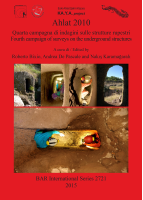Description
BOOK DESCRIPTIONLa quarta spedizione di ricerca sulle strutture sotterranee di Ahlat (Turchia sud-orientale), nel 2010, si è sviluppata su quattro obiettivi principali che hanno aggiunto nuove significative conoscenze sull'habitatrupestre di questa vasta area vulcanica.La parziale asportazione dei sedimenti che occludono un lungo cu-nicolo sta rivelando un articolato reticolo ipogeo con interessanti prospettive su sviluppo, funzioni e tecnichedi scavo. L'individuazione di un quarto acquedotto sotterraneo e la probabilelocalizzazione della tomba diun martire cristiano del XV secolo in zone rupestri periferiche, si aggiungono a ulteriori ritrovamenti nel cuore stesso dell'area archeologica: un pozzo, diverse cavità adibite a depositi agricoli, un edificio interrato(zecca), una neviera, iscrizioni lapidee, ecc. The fourth research expedition on the underground structures of Ahlat (south-eastern Turkey), in 2010,developed on four main targets that added significant new knowledge about the rocky habitat of this widevolcanic area. The partial removal of sediments that occlude a long tunnel reveal an underground complexnetwork with interesting perspectives about development, functions and excavation techniques. The identi- fication of a fourth underground aqueduct and the probable location of the tomb of a fifteenth century Chri- stian martyr in rocky peripheral areas, join to other findings in the very heart of the archaeological area: a shaft, many cavities used as farm-storage, a buried building (mint), a snow-house, tombstone inscriptions, etc.











